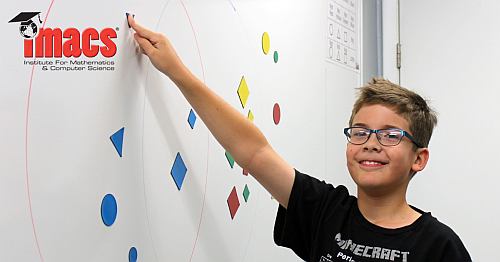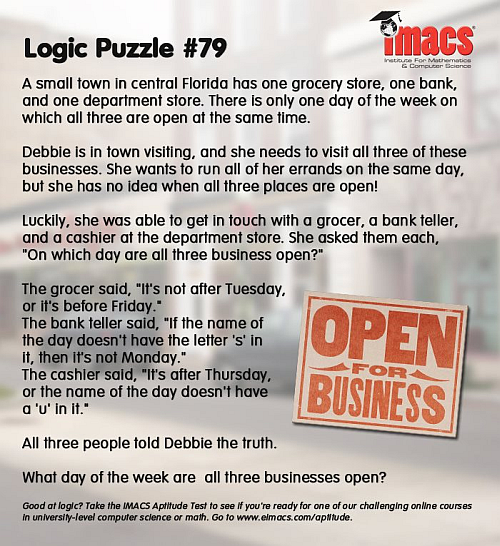
Logic is the systematic study of reasoned argument. Why study logic? For students planning to take university-level math courses, which typically involve reading and writing proofs, the benefits are evident. But even for students heading in a different direction, developing strong logical reasoning skills has benefits too.
Logic Supports Learning Mathematics
Few would dispute that arithmetic is a fundamental base upon which the successful learning of math is built. Consequently, the development of arithmetic skills receives enormous attention in elementary school. Logic is equally fundamental to learning all other areas of math but is rarely taught in elementary school. Were students to develop a strong foundation in logic at a young age, their capacity to understand middle and high school math would be greatly enhanced.
In arithmetic, we learn how to combine or break apart numbers in order to proceed from the information given to the answer sought. If we bake three dozen cookies, multiplication tells us how many cookies we have in all. If 17 cookies are left, subtraction tells us how many were eaten. Honing arithmetic skills in elementary school allows students to quickly and accurately call upon them later, thereby making it is easier to learn more advanced math in the future.
Logic is a similarly powerful and essential tool for learning more advanced math. Whereas arithmetic is used in constructing and deconstructing information that is numeric in nature, logic is essential in constructing and deconstructing assertions that are mathematical in nature.
Students typically encounter a weak version of proofs and logic for the first time in high school geometry. But by then, pre-algebra and elementary algebra have already been taught as mostly procedural rules and algorithms to accept at face value. As a result students do not develop a genuine understanding of the derivation of those rules and algorithms and why they work. By the time students reach high school, their natural curiosity about mathematical ideas has been reduced to a hard-to-break habit of memorizing and applying rules blindly.
A worthy goal of the Common Core math standards is to develop mathematical understanding in addition to procedural skills. True mathematical understanding comes with seeing how knowledge is pieced together step-by-step on the path to deriving an important result. This is similar to what we know about developing scientific understanding in young minds — hands-on projects make learning stick better than memorizing facts. Math’s version of "hands-on" is your brain working its way through the reasoning that mathematicians followed in order to provide us with neat and tidy rules.
With a strong foundation in logical reasoning, students would have the key analytical tool needed to work their way successfully through the reasoned arguments that lead to the rules. Some may even wish to achieve the deepest understanding by using logic to independently derive the mathematical truths they were once asked only to memorize.
Logic Supports Complex Problem Solving Beyond Mathematics
The amazing thing about logic is that it makes us better thinkers and problem solvers well beyond mathematics. Computer science could not exist without logic. If you want to understand the underlying principles and algorithms and be able to apply them in any programming environment, you must understand logic. Engineering disciplines rely on logic too, especially electrical engineering as any Minecrafter worth her redstone will tell you. The entire practice of law is founded upon reasoned argument, which is why the LSAT has sections on logical reasoning and analytical reasoning.
People who learn to think logically are better at analyzing complex problems. Mathematics, with its diversity of complex problems, is a natural thought playground for developing logical thinking skills. The first steps in solving any math problem are assessing the situation and coming up with a plan of attack. Can you view the larger problem as a combination of more manageable cases? Can you take what you know and derive what you need to know? Would additional information lead you to certain conclusions? Answering these types of questions requires logical thinking.
People who learn to think logically are also better at assembling solutions. Once you have assessed the problem, broken it down, and gathered the necessary information, how do you put it all together to arrive at a solution? When faced with a novel situation, can you devise an approach where there was not one before? As the pace of change in our world accelerates, every field increasingly needs people who can strongly grasp core concepts and combine them sensibly to solve any problem, especially unfamiliar ones. Learning to apply logical thinking to mathematical situations is excellent training for handling complex problems, no matter which college major or career you choose.
Logic has a way of promoting clarity of thought in understanding ideas that were previously unfocused or muddled. Whether you are planning on becoming a professional mathematician or just trying to get through math homework on your way to a different intellectually demanding career, there is no doubt that strong logical reasoning skills would ease your path.
This blog article is part of the Hoagies' Gifted Education Page March 2016 Blog Hop on Math Education Enrichment. Please click on the Blog Hop image above to learn more about Math Education Enrichment from other Hoagies' Blog Hop participants.











I enjoyed this article. Logic has always been my favorite part of math and I enjoy being able to explore it with my children in our homeschool. They love it, too, and there is no way they would be exposed to it in elementary school. Such a shame!
My two daughters are in their 20’s now but during elementary school they both participated in a math program called mathletics that was mostly math and logic problem solving. My oldest daughter started when she was in third grade and my youngest when she was in second grade. They loved the program and both excelled in high school and college math. It was an excellent public school program in the Kansas City area.